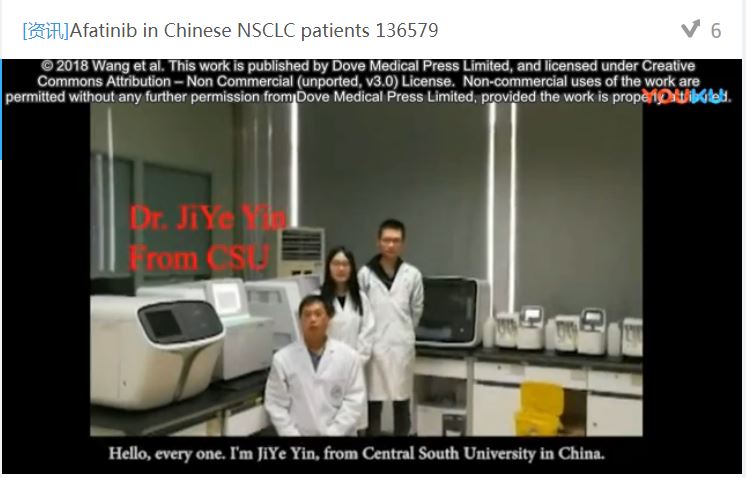108605
论文已发表
注册即可获取德孚的最新动态
IF 收录期刊
- 3.4 Breast Cancer (Dove Med Press)
- 3.2 Clin Epidemiol
- 2.6 Cancer Manag Res
- 2.9 Infect Drug Resist
- 3.7 Clin Interv Aging
- 5.1 Drug Des Dev Ther
- 3.1 Int J Chronic Obstr
- 6.6 Int J Nanomed
- 2.6 Int J Women's Health
- 2.9 Neuropsych Dis Treat
- 2.8 OncoTargets Ther
- 2.0 Patient Prefer Adher
- 2.2 Ther Clin Risk Manag
- 2.5 J Pain Res
- 3.0 Diabet Metab Synd Ob
- 3.2 Psychol Res Behav Ma
- 3.4 Nat Sci Sleep
- 1.8 Pharmgenomics Pers Med
- 2.0 Risk Manag Healthc Policy
- 4.1 J Inflamm Res
- 2.0 Int J Gen Med
- 3.4 J Hepatocell Carcinoma
- 3.0 J Asthma Allergy
- 2.2 Clin Cosmet Investig Dermatol
- 2.4 J Multidiscip Healthc

Clinical efficacy and safety of afatinib in the treatment of non-small-cell lung cancer in Chinese patients
Authors Wang LY, Cui JJ, Guo AX, Yin JY
Received 28 September 2017
Accepted for publication 5 December 2017
Published 24 January 2018 Volume 2018:11 Pages 529—538
DOI https://doi.org/10.2147/OTT.S136579
Checked for plagiarism Yes
Review by Single-blind
Peer reviewers approved by Dr Amy Norman
Peer reviewer comments 2
Editor who approved publication: Dr Carlos Vigil Gonzales
Abstract: Compared with various
malignant tumors, lung cancer has high incidence and the highest mortality
worldwide. Non-small-cell lung cancer (NSCLC), the most common kind of lung
cancer, is still a great threat to the world, including China. Surgery,
platinum-based chemotherapy, and radiotherapy are still the primary treatments
for NSCLC patients in the clinic, whereas immunotherapy and targeted therapy
are gradually playing more important roles. A next-generation tyrosine kinase
inhibitor (TKI), afatinib, was developed as a targeted reagent for epidermal
growth factor receptor (EGFR). This targeted drug was effective in a series of
trials. The US Food and Drug Administration then approved afatinib as a new
first-line treatment for EGFR L858R and exon 19 deletion mutant patients in
2013. This review focused on current clinical studies of afatinib. Although
this TKI was not widely available in China until recently, we aim to provide a
reference for its future use in China.
Keywords: afatinib,
NSCLC, Chinese patients, drug resistance, side effect, companion diagnosis
摘要视频链接:Afatinib in Chinese NSCLC patients
